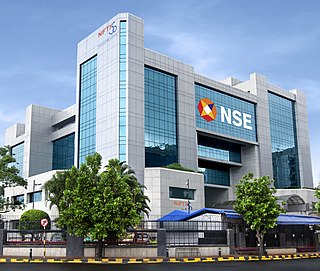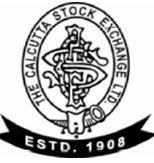
The Securities and Exchange Board of India (SEBI) is the regulatory body for securities and commodity market in India under the administrative domain of Ministry of Finance within the Government of India. It was established on 12 April 1988 as an executive body and was given statutory powers on 30 January 1992 through the SEBI Act, 1992.

BSE Limited, also known as the Bombay Stock Exchange (BSE), is an Indian stock exchange which is located on Dalal Street. Established with the efforts of cotton merchant Premchand Roychand in 1875, it is the oldest stock exchange in Asia, and also the tenth oldest in the world. The BSE is the world's 6th largest stock exchange with a market capitalization exceeding US$5 trillion on May 21, 2024.

National Stock Exchange of India Limited (NSE) is one of the leading stock exchanges in India, based in Mumbai. NSE is under the ownership of various financial institutions such as banks and insurance companies. It is the world's largest derivatives exchange by number of contracts traded and the third largest in cash equities by number of trades for the calendar year 2022. It is the 7th largest stock exchange in the world by total market capitalization, exceeding $5 trillion on May 23, 2024. NSE's flagship index, the NIFTY 50, is a 50 stock index that is used extensively by investors in India and around the world as a barometer of the Indian capital market. The NIFTY 50 index was launched in 1996 by NSE.
The Madras Stock Exchange (MSE) was a stock exchange in Chennai, India. The now defunct MSE was the fourth stock exchange to be established in the country and the first in South India. It had a turnover (2001) of ₹ 3,090 crore, but was a fraction of the turnover generated by the Bombay Stock Exchange and National Stock Exchange of India. The turnover of the stock exchange was 19,907 Crore as of the financial year 2012.

Inter-connected Stock Exchange Ltd. (ISE) is an Indian national-level stock exchange. under the ownership of Ministry of Finance, Government of India. It is responsible for providing trading, clearing, settlement, risk management and surveillance support to its trading members. It started its operation in 1998 in Vashi, Mumbai, and has 841 trading members, who are located in 18 cities. These intermediaries are administratively supported through the regional offices at Delhi, Kolkata, Patna, Ahmedabad, Coimbatore and Nagpur, besides Mumbai.

Calcutta Stock Exchange (CSE) is an Indian stock exchange based in Kolkata, India. It is owned by Ministry of Finance, Government of India. It is one of oldest stock exchanges in Asia and third largest bourse in India. It was founded in May 1908 at 2, China Bazar Street.
Cochin Stock Exchange was an Indian stock exchange in Kochi, Kerala fully owned by Government of India. It was incorporated in 1978. At its peak, it had almost 500 Indian companies listed, and with a daily turnover of ₹70–₹100 crore, it was the fourth largest exchange in India.
Madhya Pradesh Stock Exchange (MPSE) was a stock exchange located at Indore, Madhya Pradesh, India. It was a SEBI recognized Permanent Stock Exchange, until its de-recognition in 2015. Established in 1919, it was 3rd oldest stock exchange in India, and a leading stock exchange under outcry system.

The Ahmedabad Stock Exchange (ASE) is the second oldest exchange of India located in the city of Ahmedabad in the Western part of the country and is fully owned by Government of India. It is recognised by Securities Contract (Regulations) Act, 1956 as permanent stock exchange. Its logo consists of the Swastika, which is one of the most auspicious symbols of Hinduism depicting wealth and prosperity.

The National Spot Exchange Limited (NSEL) is India's first spot exchange under the ownership of 63 Moons Technologies. It was established in view of the then Prime Minister's vision to create a "single market" across the country for both manufactured and agricultural produce.
Mangalore stock exchange Limited (MGSE), is located in Mangalore, Karnataka, India. It is under the ownership of Ministry of Finance, Government of India. It was incorporated on 31 July 1984 as a public limited company. The Exchange was recognised by the Central Government for an initial period of 5 years on 9 September 1985 under section 4 of the Securities Contracts (Regulation) Act, 1956 and later on the period of recognition was extended by one year, from 9 September 1990 to 8 September 1991. The last recognition was valid up to 8 September 2003. On 31 August 2004, SEBI decided to derecognize the Mangalore Stock Exchange.
Bhubaneswar Stock Exchange (BhSE) was a stock exchange located in Bhubaneswar, Odisha, India. It was incorporated on 17 April 1989, and granted recognition to the Stock Exchange on 5 June 1989, by the Ministry of Finance, Govt. of India. It is one among the 21-odd regional stock exchanges in India.
Guwahati Stock Exchange (GSE) was a stock exchange located in Gauhati, Assam.
Magadh Stock Exchange Association Ltd (MSEA) is located in Patna, India. It was established in the year 1986. It is one among the 25 odd regional stock exchanges in India. The exchange was disbanded on 3 September 2007 by Securities and Exchange Board of India (SEBI).

Motilal Oswal Financial Services Limited is an Indian financial services company offering a range of financial products and services. The company was founded by Motilal Oswal and Raamdeo Agrawal in 1987.
National Spot Exchange Limited (NSEL) case relates to a payment default at the National Spot Exchange Limited that occurred in 2013 involving Financial Technologies India Ltd, when a payment default took place after a commodities market regulator, the Forward Markets Commission (FMC), directed NSEL to stop launching contracts. This led to the closure of the Exchange in July 2013.
Angel One Limited, formerly known as Angel Broking Limited, is an Indian stockbroker firm established in 1996. The company is a member of the Bombay Stock Exchange, National Stock Exchange of India, National Commodity & Derivatives Exchange Limited and Multi Commodity Exchange of India Limited. It is a depository participant with Central Depository Services Limited (CDSL).

Karvy Group is a financial services company in India. It was involved in financial services like equity, commodities trading, depository and wealth services and distribution of other financial products. It has its headquarters in Hyderabad. It also had branch offices outside India in Bahrain, Dubai, Malaysia, Philippines and the United States.
The NSE co-location scam relates to the market manipulation at the National Stock Exchange of India, India's leading stock exchange. Allegedly select players obtained market price information ahead of the rest of the market, enabling them to front run the rest of the market, possibly breaching the NSE's purpose of demutualisation exchange governance and its robust transparency-based mechanism. The alleged connivance of insiders by rigging NSE's algo-trading and use of co-located servers ensured substantial profits to a set of brokers. This widespread market fraud came to light when markets' regulator, the Securities and Exchange Board of India (SEBI), received the first anonymous complaint through a whistle-blower's letter in January 2015. The whistle-blower alleged that trading members were able to capitalise on advance knowledge by colluding with some exchange officials. The overall default amount through NSE's high-frequency trading (HFT) is estimated to be ₹500 billion over five years.
Financial regulation in India is governed by a number of regulatory bodies. Financial regulation is a form of regulation or supervision, which subjects financial institutions to certain requirements, restrictions and guidelines, aiming to maintain the stability and integrity of the financial system. This may be handled by either a government or non-government organization. Financial regulation has also influenced the structure of banking sectors by increasing the variety of financial products available. Financial regulation forms one of three legal categories which constitutes the content of financial law, the other two being market practices and case law.








